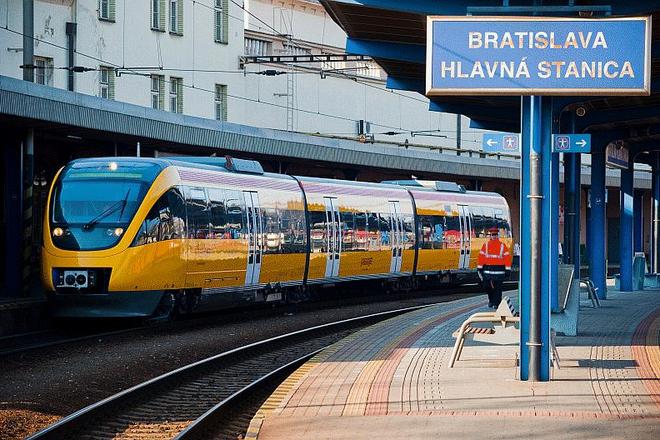AFTER all the negative headlines about higher fares and discontinued services, rail passengers have now been served up some better-sounding news. On March 4, RegioJet, a member of the Czech Student Agency group, will start operating regional rail service on a route linking Bratislava, Dunajská Streda and Komárno, south-east from the capital. It promises a new, improved quality of rail passenger transport. This, along with the raising price of motor fuels, may get more people onto trains and relieve the overloaded road transport system around Bratislava. RegioJet introduced two train sets in the firm’s distinctive yellow livery, as well as timetables and fares, on January 31.
RegioJet already offers a limited service in Slovakia: some of its fast trains from Prague via Ostrava to Havířov in the Czech Republic continue to the Slovak city of Žilina. But the Bratislava-Komárno route will be the first service that the private rail firm operates wholly in Slovakia. RegioJet will in fact be the first private company to operate a regional route anywhere in the country. The Slovak Transport Ministry wants to continue the liberalisation of regional railway transport.
“The arrival of the first private carrier on Slovak rail tracks is an historic moment,” Transport Minister Ján Figeľ said at the presentation of the trains at Bratislava’s main station. “I believe that it will further deepen trends, which we have started up, by also drawing people from full and overloaded roads onto trains.”
The Bratislava-Dunajská Streda-Komárno route is 100 kilometres long and while it is not currently among the country’s most heavily used lines, the significant volume of new housing that has been or will be built along the route promises to further complicate the already difficult situation on local roads, especially at peak hours.
RegioJet will offer more than 25 trains a day in each direction between Bratislava and Dunajská Streda, with more than 10 trains in each direction continuing all the way to Komárno. It promises that during peak hours its trains will carry passengers between Bratislava’s Nové Mesto station to Dunajská Streda, a distance of 47 kilometres, in 38 minutes in the case of special fast trains.
“This will mean a shorter time compared with one hour and 10 to 15 minutes which the bus needs,”
Jiří Schmidt, the RegioJet business director for railway transport at Student Agency group said.
RegioJet also promises a free internet connection on its trains as well as newspapers and the opportunity to buy refreshments. It also promises better connections with other means of transport, and intends to make rail transport more convenient for car owners by supporting a ‘park and ride’ scheme via the construction of parking lots at the railway stations in Kvetoslavov and Dunajská Streda.
Regards fares, RegioJet will be cheaper over short distances of up to five kilometres and over longer distances beyond 60 km than the state-owned rail passenger operator Zelezničná Spoločnosť Slovensko (ZSSK). It will offer discounts for regular travellers.
Minister Figeľ and Pavol Frešo, the president of the Bratislava Self-Governing Region, hope that higher-quality regional transport will also help boost local tourism.
Representatives of the Transport Ministry and RegioJet signed a contract covering subsidised operation of the regional route in December 2010. It covers the period from March 2012 to December 2020. The state will pay the private carrier €5.90 per train-kilometre, less than the €6.76 per train-kilometre it currently pays ZSSK, the SITA newswire reported.
Former transport minister Ľubomír Vážny of the opposition Smer party has criticised the contract in part because there was no tender for the licence to operate the route. He said, as quoted by the Hospodárske Noviny daily, that he believes that if a proper tender had been held, ZSSK would have offered better fares.
ZSSK said it considers RegioJet to be a potential future partner and not just a competitor. It will cease operating the Bratislava-Dunajská Streda-Komárno route on March 3.
RegioJet set its fares in cooperation with ZSSK in order to be prepared for integration of tariffs and mutual recognition of tickets.
The Transport Ministry says it wants to continue liberalising regional passenger rail transport. Slovakia could free up to one tenth of the entire passenger rail market, of which RegioJet has already taken a portion, the Trend economic weekly wrote in its online edition.
The ministry has already held talks with six railway companies, including RegioJet and Arriva, about operating passenger rail services on other regional routes in western Slovakia. The ministry is leaving the selection of regional operators up to the government that is formed after the March 10 general election.
The number of railway passengers increased by over 2 percent in 2011, during which ZSSK transported a total of 45.9 million passengers. Minister Figeľ said this was the first increase following a 12-year decline.
However, due to recent fare increases, the number of railway passengers decreased again in November and December, SITA reported. The new price policy prevents passengers from ‘compiling the fare’, a practice in which passengers used to make up the fare for a longer trip by using cheaper tickets for a series of shorter stretches of the route. Fares on some shorter distances went up by as much as 50 percent when ZSSK announced fare hikes averaging 10 percent in November. ZSSK said it would be able to assess the full impact of the new fares on passenger numbers only next year.
The rising prices of motor fuels, which recently broke new records in Slovakia, are also forcing Slovaks to swap cars for buses and trains.


 One of RegioJet's trains in Bratislava. (source: SITA)
One of RegioJet's trains in Bratislava. (source: SITA)